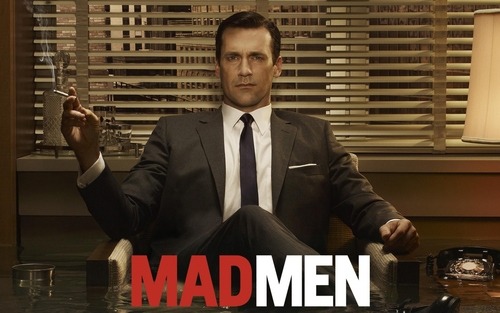Don Draper & An Old Fashioned, Please

While reading through Vincent Miller’s Consuming Religion: Christian Faith and Practice in a Consumer Culture and William Cavanaugh’s Being Consumed: Economics and Christian Desire, one image continually popped into my head: Don Draper. Don Draper, played by the dapper Jon Hamm, is the central character on the American Movie Channel series Mad Men. The series is set in the fictional 1960s New York City advertising agency, Sterling, Cooper, Draper, Price, on Madison Avenue. Don Draper, known for his outward cynicism and arrogance, is the creative director at the agency, and his smooth words can convince even the most skeptical executives to hand over their advertising business. Consumer culture dominates the discussions and interactions in Mad Men, as episode after episode, the creative teams dream of campaigns to sell the next best product.
Mad Men connects perfectly to the two texts in that it illustrates several of the main points:
“Our relationships with products tend to be short-lived: rather than hoarding treasured objects, consumers are characterized by a constant dissatisfaction with material goods. This dissatisfaction is what produces the restless pursuit of satisfaction in the form of something new. Consumerism is not so much about having more as it is about having something else; that’s why it is not simply buying but shopping that is at the heart of consumerism.”[1]
The heart of the advertising business is to lure consumers toward a product and generally away from a competing product. If you use Colgate toothpaste, the makers of Crest want you to believe that you will have a better and more fulfiling brushing experience if you switch. Don Draper was the master at getting into the heads of shoppers. He knew what would tug on their heart strings and strike their sentimental chords.
“What really characterizes consumer culture is not attachment to things but detachment. People do not hoard money; they spend it. People do no cling to things; they discard them and buy other things.”[2]
Our culture fosters the notion that acquisition of material items can make us happy and fulfilled. The American Dream is rooted in materialism: a house, a car, and a well-paying job. The latter is, of course, only to make the former possible. Our society is a capitalistic one. We value those who can make something of themselves. This, of course, implies that the happy and successful American is one who has attained material wealth. This mentality of our society fits perfectly into the notion of consumerism. The more we can buy, the happier we will be.
Within Sterling, Cooper, Draper, Price, nothing was held as treasured objects. Loyalty was not in their vocabulary. While they celebrated the account of Jaguar, they continued their pursuit of Ford. Though they had Mohawk Airlines, they risked the account and their integrity to pursue American Airlines. This, of course, blends perfectly with the product that the agency produces: the desire to buy. What we have now cannot be enough. The next big thing is bigger and better. Like the product they sell, the agency itself constantly sought bigger, better accounts and the bigger, better products.
“Marketing constantly seeks to meet, create, and stoke new desires, often by highlighting a sense of dissatisfaction with what one presently has and is. … Rather than turning away from material things and toward God, in consumer culture we plunge ever more deeply into the world of things.”[3]
This seems almost inevitable in the society we have created. The things of God are the antithesis of The American Dream. All that Christ teaches is directly contrary to the notion of acquiring and spending for our own comfort, pleasure and gratification.
Miller concludes,
“When consumption becomes the dominant cultural practice, belief is systematically misdirected from traditional religious practices into consumption.”[4]
Cavanaugh expands on this further,
“Consumerism is not simply people rejecting spirituality for materialism. For many people, consumerism is a type of spirituality, even if they do not recognize it as such. It is a way of pursuing meaning and identity, a way of connecting with other people.”[5]
While I agree that our society absolutely pursues meaning and identity through consumerism, and I can accept that people do seek comfort, fulfillment and perhaps even peace, through seeking and acquiring possessions, I question that many see consumerism as a way of authentic connection with others. Perhaps the authors intend for the connection piece to create common ground for those to begin conversations or form small groups around like-minded interests. “Oh, nice shoes! Where did you get them?” Will a real friendship or connection begin with that? Is there something deeper to ponder? Or to the contrary, is a fundamental basis of consumerism personal acquisition? I want it for me…
[1] William Cavanaugh, Being Consumed: Economics and Christian Desire (Grand Rapids: Eerdmans Publishing Company, 2008), Loc. 407, Kindle Edition.
[2] Cavanaugh, Loc. 403.
[3] Cavanaugh, Loc. 942.
[4] Vincent J. Miller, Consuming Religion: Christian Faith and Practice in a Consumer Culture (New York: Bloomsbury, 2003), 225.
[5] Cavanaugh, Loc. 422.
Leave a Reply
You must be logged in to post a comment.